Series production
In 1972, the makers of the long-running children's television series Jackanory started to develop new story-telling format. Whereas Jackanory had been a simple 15-minute reading of a story, designed to encourage children themselves to read, the new Jackanory Playhouse would be a full-cast anthology series dramatizing traditional folk tales. The producers of Playhouse, however, quickly made an exception for noted British children's author, Helen Cresswell. She was commissioned to write a wholly original play, and delivered Lizzie Dripping and the Orphans. [1] It is unclear whether this was originally meant to be a pilot, but following the success of the December 1972 broadcast, a full series of Lizzie Dripping was ordered by the BBC.
Unlike other BBC properties by Cresswell, Lizzie Dripping's status as a series based on previous novels is somewhat ambiguous. The characters and situations were original to the so-called pilot. The first series followed too closely on that pilot for Cresswell to have written and published books in the intervening time. However, the series broadcast in 1975 was mostly based upon three Lizzie Dripping novels that she had published in 1974. Thus, the property is a mixture of elements which first appeared on television and some that first appeared in print.
The show's location work was filmed in Eakring, Nottinghamshire, which was, at the time, Cresswell's home. [2] The episodes were directed by Paul Stone, who had been a director on Jackanory since 1969 and would later spend the 1980s producing some of Britain's top children's dramas, some of them written by Cresswell herself. One of the episodes featured the choristers from nearby Southwell Minster.
The series has been at least partially released on VHS. In 1990, the BBC put out the second, third and fourth stories of the second series under the banner, Lizzie Dripping and the Little Angel. At that time, the British Board of Film Classification gave the collection the rating of U. This video was only released in PAL format.
On 16 October 2017, Dazzler Media released the complete BBC series in a two DVD set entitled Lizzie Dripping The Complete Series One & Two, listed in some sources as Lizzie Dripping & Lizzie Dripping Rides Again (Originally listed by the BBC in 1975 as Lizzie Dripping Again, though the word Again was omitted from the opening title caption of the episodes, which remained in the original series one format of Lizzie Dripping and .........). All nine episodes of the series are included in the set, but the Jackanory Playhouse original episode is not, presumably because it has been wiped. [3]
While an adaptation of the 1973 series appeared at the conclusion of the broadcast of that series, original Lizzie books have been in continuous publication in the UK since their publication as Jackanory Story Books in 1974. Though most of the publication activity in the years since the television show ended has surrounded republication of work done in 1973 and 1974, there have been occasional new stories, such as 1994's Lizzie Dripping on Holiday. The character made a partial return to television when a set of these stories under the general title Lizzie Dripping and the Witch, was read on Jackanory in 1992 by Patricia Routledge; the previous year Routledge had read Lizzie Dripping by Moonlight on the same programme. [4]
Some of the stories have seen audio release as well. The most notable may be a 2001 BBC Audiobooks "Cover to Cover" recording by Tina Heath called simply, Lizzie Dripping.

Up Pompeii! is a British television comedy series set in ancient Pompeii and broadcast between 1969 and 1970, starring Frankie Howerd. The first series was written by Talbot Rothwell, a scriptwriter for the Carry On films, and the second series by Rothwell and Sid Colin. Two later specials were transmitted in 1975 and 1991 and a film adaptation was released in 1971.

Are You Being Served? is a British television sitcom that was broadcast from 1972–1985. It was created and written by David Croft, who also served as executive producer and director, and Jeremy Lloyd. Michael Knowles and John Chapman also wrote certain episodes. Produced by the BBC, the series starred Mollie Sugden, Trevor Bannister, Frank Thornton, John Inman, Wendy Richard, Arthur Brough, Nicholas Smith, Larry Martyn, Harold Bennett and Arthur English.

Worzel Gummidge is a scarecrow in British children's fiction, who originally appeared in a series of books by the English novelist Barbara Euphan Todd. It was the first story book published by Puffin Books.
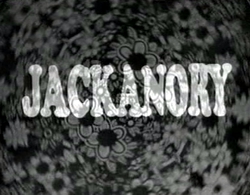
Jackanory is a BBC children's television series which was originally broadcast between 1965 and 1996. It was designed to stimulate an interest in reading. The show was first transmitted on 13 December 1965, and the first story was the fairy-tale "Cap-o'-Rushes" read by Lee Montague. Jackanory was broadcast until 1996, with around 3,500 episodes in its 30-year run.
Helen Cresswell was an English television scriptwriter and author of more than 100 children's books, best known for comedy and supernatural fiction. Her most popular book series, Lizzie Dripping and The Bagthorpe Saga, were also the basis for television series.
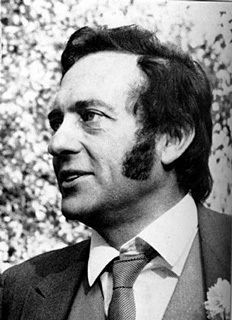
Harry H. Corbett was an English actor and comedian, best remembered for playing rag-and-bone man Harold Steptoe alongside Wilfrid Brambell in the long-running BBC television sitcom Steptoe and Son. His success on television led to appearances in comedy films including The Bargee (1964), Carry On Screaming! (1966) and Jabberwocky (1977).
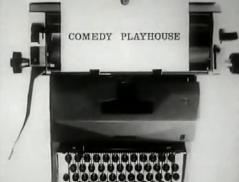
Comedy Playhouse is a long-running British anthology series of one-off unrelated sitcoms that aired for 128 episodes from 1961 to 1975. Many episodes later graduated to their own series, including Steptoe and Son, Meet the Wife, Till Death Us Do Part, All Gas and Gaiters, Up Pompeii!, Not in Front of the Children, Me Mammy, That's Your Funeral, The Liver Birds, Are You Being Served? and particularly Last of the Summer Wine, which is the world's longest running sitcom, having run from January 1973 to August 2010. In all, 27 sitcoms started from a pilot in the Comedy Playhouse strand.

Button Moon is a British children's television programme broadcast in the United Kingdom in the 1980s on the ITV network. Thames Television produced each episode, which lasted ten minutes and featured the adventures of Mr. Spoon who, in each episode, travels to Button Moon in his homemade rocket ship. All the characters are based on kitchen utensils, as are many of the props.
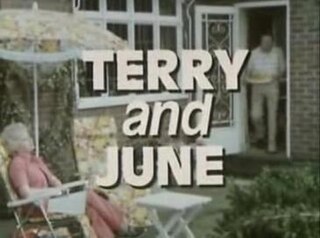
Terry and June is a BBC television sitcom, which was broadcast on BBC1 from 1979 to 1987. The show was largely a reworking of Happy Ever After, and starred Terry Scott and June Whitfield as a middle-aged, middle-class suburban couple, Terry and June Medford, who live in Purley.
Tina Heath is a British actress and former television presenter. She and husband Dave Cooke have two children.

Wodehouse Playhouse is a British television comedy series based on the short stories of P. G. Wodehouse. From 1974 to 1978, a pilot and three series were made, with 21 half-hour episodes altogether in the entire series. The series has been released on home video.

An anthology series is a written series, radio, television, film, or video game series that presents a different story and a different set of characters in each different episode, season, segment, or short. These usually have a different cast in each episode, but several series in the past, such as Four Star Playhouse, employed a permanent troupe of character actors who would appear in a different drama each week. Some anthology series, such as Studio One, began on radio and then expanded to television.
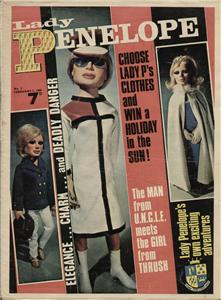
Lady Penelope was a British weekly comic book magazine for girls which ran from 1966 to 1969. Produced by Century 21 Publications and published by City Magazines, it was a sister publication to TV Century 21. Lady Penelope was edited by Gillian Allan, wife of comic strip writer Angus Allan.
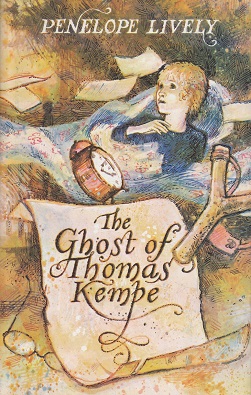
The Ghost of Thomas Kempe is a low fantasy novel for children by Penelope Lively, first published by Heinemann in 1973 with illustrations by Anthony Maitland. Set in present-day Oxfordshire, it features a boy and his modern family who are new in their English village, and seem beset by a poltergeist. Soon the boy makes acquaintance with the eponymous Thomas Kempe, ghost of a 17th-century resident sorcerer who intends to stay.
John Griffith Bowen was a British playwright and novelist.
This is a list of British television related events from 1974.
This is a list of British television related events from 1973.
This is a list of British television related events from 1972.
Barbara Mitchell was an English actress who became a familiar face on British television in the 1960s and 1970s, best known for her work in many classic sitcoms of the period.
Jane Lowe is an English actress. She is best known for portraying the roles of Aunt Blodwen in Lizzie Dripping (1973–1975), Mam in the BBC children's programme Jonny Briggs (1985–1987) and Monica Lindsey in the ITV drama Bad Girls (1999–2001). Throughout her career on stage and screen that has spanned over five decades, she has appeared in Coronation Street, The Bill and Doctors on numerous occasions as various characters and co-starred in the horror film The Creeping (2022).












